Africa’s Social and Economic History
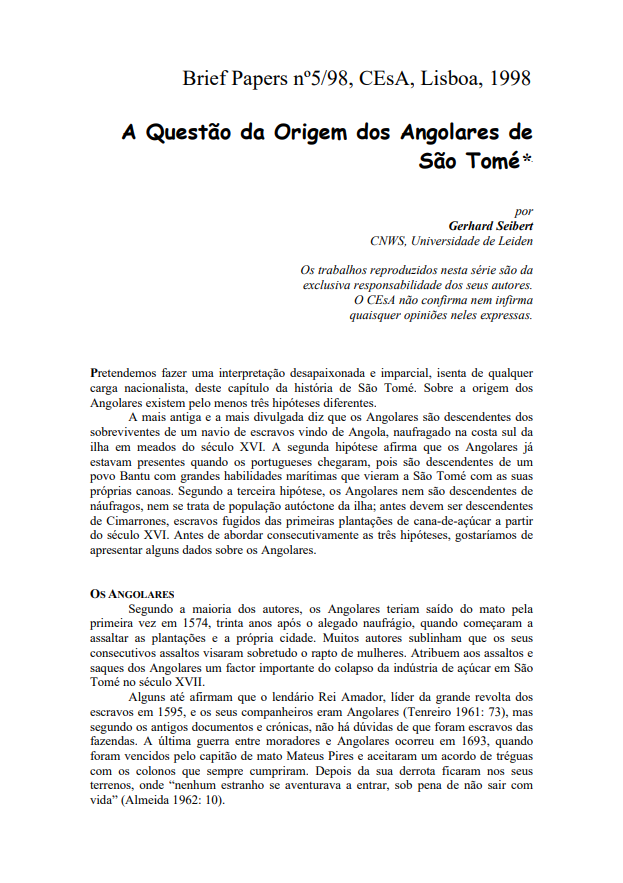
Brief Paper 5/1998: A Questão da Origem dos Angolares de São Tomé
Abstract:
We intend to make a dispassionate and impartial interpretation, free of any nationalist charge, of this chapter in the history of São Tomé. There are at least three different hypotheses about the origin of the Angolares. The oldest and most widespread says that the Angolares are descendants of the survivors of a slave ship from Angola that sank off the southern coast of the island in the mid-sixteenth century. The second hypothesis states that the Angolares were already present when the Portuguese arrived, since they are descendants of a Bantu people with great maritime skills who came to São Tomé with their own canoes. According to the third hypothesis, the Angolares are neither descendants of castaways, nor are they an indigenous population of the island; rather, they must be descendants of Cimarrones, runaway slaves from the first sugar cane plantations after the 16th century. Before dealing consecutively with the three hypotheses, we would like to present some data about the Angolares. Paper presented at the 1998 CESA Seminar: A Problemática do Desenvolvimento – Historicidade e Contributos Actuais numa Óptica Transdiciplinar (The Problem of Development – History and Current Contributions from a Transdisciplinary Perspective), Conference on A Questão da Origem dos Angolares em São Tomé (The Question of the Origin of the Angolares in São Tomé), 19 May 1998.
Quotation:
Seibert, Gerhard. 1998. “A questão da origem dos Angolares de São Tomé”. Instituto Superior de Economia e Gestão – CEsA Brief papers nº 5-1998.
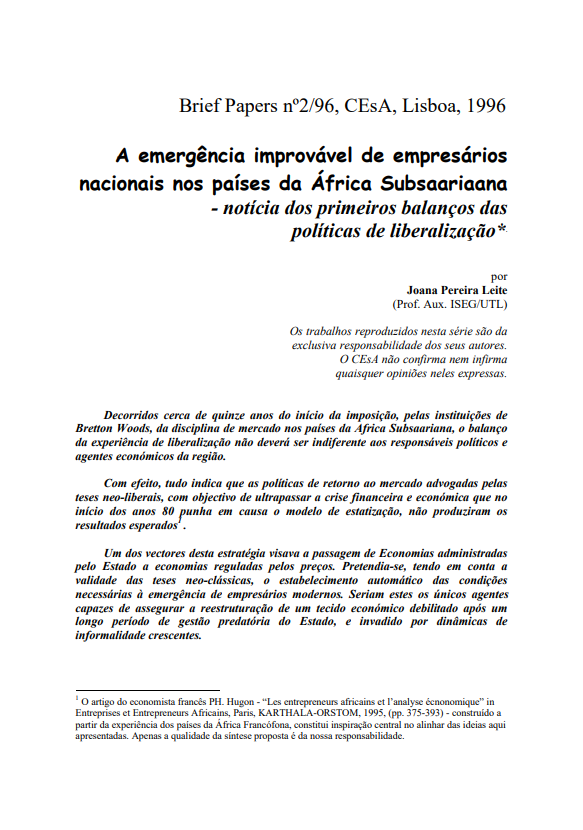
Brief Paper 2/1996: A Emergência Improvável de Empresários Nacionais nos Países da África Subsaariaana: Notícia dos primeiros balanços das políticas de liberalização
Abstract:
About fifteen years after the Bretton Woods institutions started imposing market discipline on the countries of Sub-Saharan Africa, the assessment of the liberalisation experience should not be indifferent to political leaders and economic players in the region. In fact, everything indicates that the policies of return to the market advocated by the neo-liberal theses, with the aim of overcoming the financial and economic crisis which, at the beginning of the 1980s, called the nationalisation model into question, did not produce the expected results. One of the vectors of this strategy was the transition from state-managed economies to price-regulated economies. Taking into account the validity of the neoclassical theses, the aim was the automatic establishment of the necessary conditions for the emergence of modern entrepreneurs. These would be the only agents capable of ensuring the restructuring of a weakened economic fabric after a long period of predatory management by the state, and invaded by growing dynamics of informality. A emergência improvável de empresários nacionais nos países da África Subsaariaana: notícia dos primeiros balanços das políticas de liberalização is not intended to recall the “formal/informal” debate, so dear to the economic literature of the last two decades. Bearing in mind the extreme economic complexity of African societies, the aim is simply to highlight some relevant, though not always evident, aspects of recent reflection on the difficult emergence of the African business class in the context of adjustment policies.
Quotation:
Leite, Joana Pereira. 1996. “A emergência improvável de empresários nacionais nos países da África Subsaariaana : notícia dos primeiros balanços das políticas de liberalização”. Instituto Superior de Economia e Gestão – CEsA Brief papers nº 2-1996
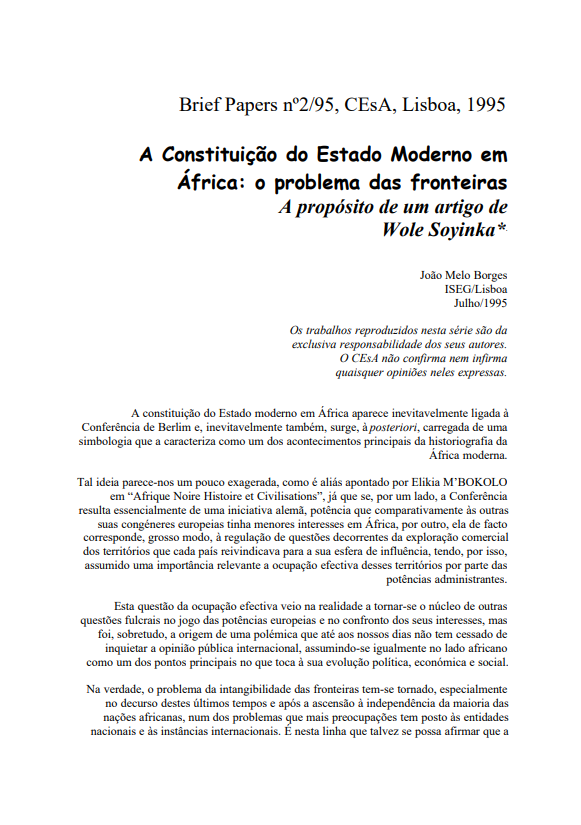
Brief Paper 2/1995: A Constituição do Estado Moderno em África: O problema das fronteiras: a propósito de um artigo de Wole Soynka
Abstract:
The constitution of the modern state in Africa is inevitably linked to the Berlin Conference and, inevitably, it is also loaded with a symbology that characterises it as one of the main events in the historiography of modern Africa. This idea seems a little exaggerated to us, as Elikia M ‘BOKOLO points out in “Afrique Noire Histoire et Civilisations”, since, if on the one hand, the Conference was essentially the result of a German initiative, a power which, compared to its European counterparts, had fewer interests in Africa, on the other, it in fact corresponded, roughly speaking, to the regulation of questions arising from the commercial exploitation of the territories that each country claimed for its sphere of influence. In fact, this question of effective occupation became the core of other questions at the heart of the game of European powers and the confrontation of their interests, but it was, above all, the origin of a polemic that has not ceased to disturb international public opinion to this day, also becoming, on the African side, one of the main points as regards its political, economic and social evolution. In fact, the problem of the intangibility of borders has become, especially in recent times and after the rise to independence of most African nations, one of the most worrying issues for national entities and international bodies. A constituição do Estado Moderno em África : o problema das fronteiras : a propósito de um artigo de Wole Soynka was elaborated within the scope of the course História de África of the Master in International Development and Cooperation taught at the ISEG/UTL, of which Prof. Joana Pereira Leite is in charge.
Quotation:
Borges, João Melo. 1995. “A constituição do Estado Moderno em África : o problema das fronteiras : a propósito de um artigo de Wole Soynka”. Instituto Superior de Economia e Gestão – CEsA Brief papers nº 2-1995
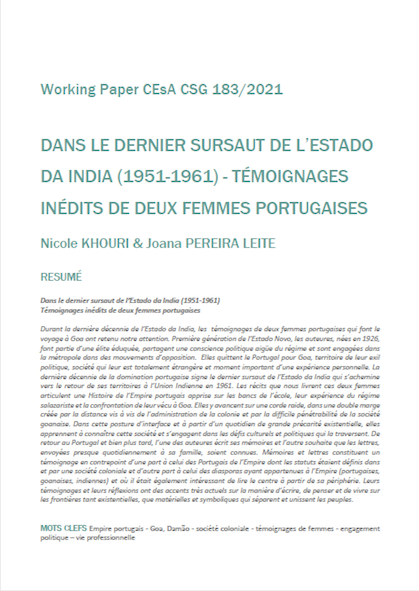
Working Paper 183/2021: Dans le Dernier Sursaut de l’Estado da Índia (1951-1961): Témoignages inédits de deux femmes portugaises
Abstract:
During the last decade of Estado da Índia, the testimonies of two Portuguese women who embark on a trip to Goa have caught our attention, getting us to write Dans le dernier sursaut de l’Estado da Índia (1951-1961) : témoignages inédits de deux femmes portugaises. Born in 1926 and part of the first generation of Estado Novo, the authors belong to an educated elite and share an acute political awareness of the regime, choosing even to engage in the metropolis opposition movements. They left Portugal for Goa, the territory of their political exile, a society totally alien to them and an important moment of personal experience. The last decade of the Portuguese domination sign the last burst of Estado da Índia which is moving towards the return of its territories to the Indian Union in 1961. The stories left by these two women articulate a history of the Portuguese empire, learned on school benches, portraying an experience of the Salazarist regime and the confrontation of the authors’ experience in Goa. There they make their way on a tightrope, created both by the distance to the colonial administration and by the difficult penetrability of Goan society. In this interface and stemming from an everyday of existential precariousness, they get to know this society and engage in the cultural and political challenges that cross it. Back in Portugal and later on, one of the authors write her memories and the other wish for the exposure of the letters, that she daily written to her family . The memoirs and letters constitute a counterpoint testimony, on the one hand to that of the Portuguese of the Empire (whose statuses and belonging were defined in a colonial society) and, on the other, to that of the diasporas belonging to the Empire (Portuguese, Goans , Indians) by where it is also interesting to read the center from its periphery. Their testimonies and their reflections have very current accents on the way of writing, of thinking and living on existential, material, and symbolic borders that both separate and unite people.
Quotation:
Khouri, Nicole e Joana Pereira Leite (2021). “Dans le dernier sursaut de l’Estado da Índia (1951-1961) : témoignages inédits de deux femmes portugaises”. Instituto Superior de Economia e Gestão – CEsA/ CSG –Documentos de Trabalho nº 183/2021.
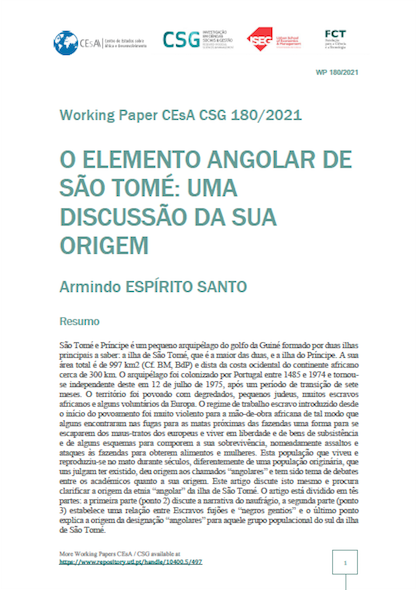
Working Paper 180/2021: O Elemento Angolar de São Tomé: Uma discussão da sua origem
Abstract:
São Tomé and Príncipe is a small archipelago in the Gulf of Guinea formed by two main islands, namely: the island of São Tomé, which is the larger of the two, and the island of Príncipe. Its total area is 997 km2 (Cf. BM, BdP) and is approximately 300 km from the west coast of the African continent. The archipelago was colonized by Portugal between 1485 and 1974 and became independent on July 12, 1975, after a seven-month transition period. The territory was populated with exiles, small Jews, many African slaves and some volunteers from Europe. The slave labor regime introduced since the beginning of the settlement was very violent for the African labor in such a way that some found in the escapes to the forests close to the farms a way to escape the mistreatment of the Europeans and live in freedom and subsistence goods and some schemes to compose their survival, namely assaults and attacks on farms to obtain food and women. This population that lived and reproduced in the bush for centuries, unlike an original population, which some believe to have existed, gave rise to the so-called “Angolas” and has been the subject of debates among academics as to its origin. This article discusses this and seeks to clarify the origin of the “Angolar” ethnic group on the island of São Tomé. O Elemento Angolar de São Tomé: Uma discussão da sua origem is divided into three parts: the first part (point 2) discusses the narrative of the shipwreck, the second part (point 3) establishes a relationship between fugitive slaves and “Black Gentiles” and the last point explains the origin of the designation “Angolas ” for that population group in the south of the island of São Tomé.
Quotation:
Santo, Armindo Espírito (2021). “O elemento angolar de São Tomé: uma discussão da sua origem”. Instituto Superior de Economia e Gestão – CEsA/ CSG – Documentos de Trabalho nº 180/2021.
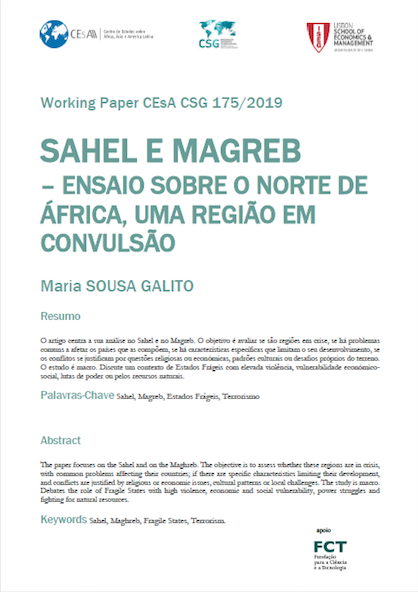
Working Paper 175/2019: Sahel e Magreb: Ensaio sobre o Norte de África, uma região em convulsão
Abstract:
Sahel e Magreb : ensaio sobre o norte de África, uma região em convulsão focuses on the Sahel and on the Maghreb. The objective is to assess whether these regions are in crisis, with common problems affecting their countries; if there are specific characteristics limiting their development, and conflicts are justified by religious or economic issues, cultural patterns or local challenges. The study is macro. Debates the role of Fragile States with high violence, economic and social vulnerability, power struggles and fighting for natural resources. The paper is subdivided into two chapters. The first compares the Sahel and Maghreb regions, with a short analysis for each country that constitutes them, since the spaces are very related to each other, since traffickers transit along the trade routes of the ancient caravans of the desert caravans, or less watched over by law enforcement agents or controlled by guerrillas or or controlled by guerrilla or terrorist groups. Maps and statistical tables are offered for appropriate comparisons. The second chapter is about the influence of the Arab Spring in North Africa, with reference its main causes and consequences. Given that these states are considered fragile by the international community, the question is whether they are failures and why they have serious problems of governance, internal stability or the stability of their borders. It assesses the fight against terrorism, in a sensitive in a sensitive context where former guerrilla fighters are still active, part of militias or terrorist groups or claiming possession of natural resources, reclaiming for themselves the sources of income and the channels of distribution. sources of income and channels of distribution. Different types of violence or organised crime are also differentiated crimes.
Quotation:
Galito, Maria Sousa (2019). “Sahel e Magreb : ensaio sobre o norte de África, uma região em convulsão”. Instituto Superior de Economia e Gestão – CEsA/ CSG – Documentos de Trabalho nº 175/2019.





